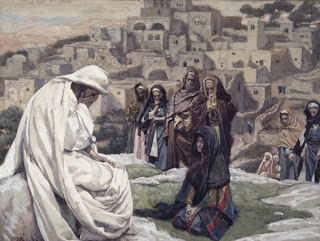1.
Review Matthew
26:36-46; Mark 14:32-42; Luke 22:39-46, making a list of words and phrases that
describe the Savior’s suffering.
in agony, praying earnestly, sweat was drops of blood, amazed, awestruck, astonished as he entered the Garden, depressed, dejected when he left his apostles and felt very heavy, or felt no pity and no comfort, his heart felt exceedingly sorrowful
2.
Write additional
insights about the Savior’s suffering in Gethsemane found in the following
resources:
Mosiah said, "he shall asuffer btemptations, and pain of body, chunger, thirst, and fatigue, even more than man can dsuffer, except it be unto death;" and Alma says, "he [will] bloose the bands of death." also that, "he may know according to the flesh how to csuccor his people according to their infirmities." D&C says, " I, God, have asuffered these things for all, that they might not bsuffer if they would crepent" also that he, "suffer[ed] both body and spirit" and, "I partook andafinished my preparations unto the children of men."
· The institute student manual commentary, “To What
Extent Was the Atonement Completed in the Garden of Gethsemane?” (pg. 173)
It says, "In that bitterest hour the dying Christ was alone, alone in most terrible reality. That the supreme sacrifice of the Son might be consummated in all its fulness, the Father seems to have withdrawn the support of His immediate Presence, leaving to the Savior of men the glory of complete victory over the forces of sin and death.”
· The institute student manual commentary for Luke
22:44, “And Being in an Agony, He Prayed More Earnestly” (pgs.173-74)
It says, "“Groaning beneath this concentrated load, this intense, incomprehensible pressure, this terrible exaction of
Divine Justice, from which feeble humanity shrank, and through the agony thus experienced sweating great drops of blood, He was led to exclaim, ‘Father, if it be possible, let this cup pass from me.’ He had wrestled with the superincumbent load in the wilderness, He had struggled against the powers of darkness that had been let loose upon him there; placed below all things, His mind surcharged with agony and pain, lonely and apparently helpless and forsaken, in his agony the blood oozed from His pores.
· The institute student manual commentary for Luke
22:44, “And His Sweat Was As It Were Great Drops of Blood Falling Down to the
Ground” (pg. 174)
It says, "It was not physical pain, nor mental anguish alone, that caused Him to suffer such torture as to produce an extrusion of blood from every pore; but a spiritual agony of soul such as only God was capable of experiencing. No other man, however great his powers of physical or mental endurance, could have suffered so; for his human organism would have succumbed, and syncope would have produced unconsciousness and welcome oblivion. In that hour of anguish Christ met and overcame all the horrors that Satan, ‘the prince of this world’ could inflict.
3.
Read Matthew 26:36 and
the institute student manual commentary for Matthew 26:36, “Then Cometh Jesus …
unto a Place Called Gethsemane” (pgs. 172-73). Write a paragraph about how the
meaning of Gethsemane adds insight to what the Savior experienced there.
I remember learning in my Book of Mormon class on campus about the 'oil-press' and how it was most likely a mill where olives were pressed to make olive oil and that is was most likely a place the Savior often wen to ponder, pray, or meet with his disciples. In that verse of MAtthew it says, "Then cometh Jesus with them unto a place calledaGethsemane, and saith unto the disciples, Sit ye here, while I go and bpray yonder." Possibly the disciples thought it was a regular occurence is this instance and didn't think much of what he was gone to pray about. Maybe this is why they didn't both to watch or stay awake till he was done?
4.
Write response to
each of the following questions, looking for lessons you can apply to your own
life from the example of the Savior in Gethsemane:
· What were the Savior’s disciples doing while He was
praying? What had the Lord taught the Apostles in Matthew 26:41? What does His
example teach about how to be obedient even when “the spirit indeed is willing,
but the flesh is weak”? How does Doctrine and Covenants 10:5 apply to this
verse?
They had tried to stay awake, but fell asleep waiting for Him. He taught them that good intent will not safe anyone. I think it stresses the importance of knowing why you are willing and why you follow te commandments. Their needs to be a true commitment and a true testimony built to stay with God.
· Read Mosiah 15:7; 3 Nephi 11:11; Doctrine and
Covenants 19:19. Write the phrases from these verses that describe what
motivated the Savior to “drink the bitter cup.”
Mosiah says that he was, "slain, the bflesh becoming subject even unto death, the cwill of the Son being swallowed up in the will of the Father." 3 Nephi says that He, " have glorified the Father" by drinking the bitter cup. Also in D&C, it says, "glory be to the Father, and I partook andafinished my preparations unto the children of men."














